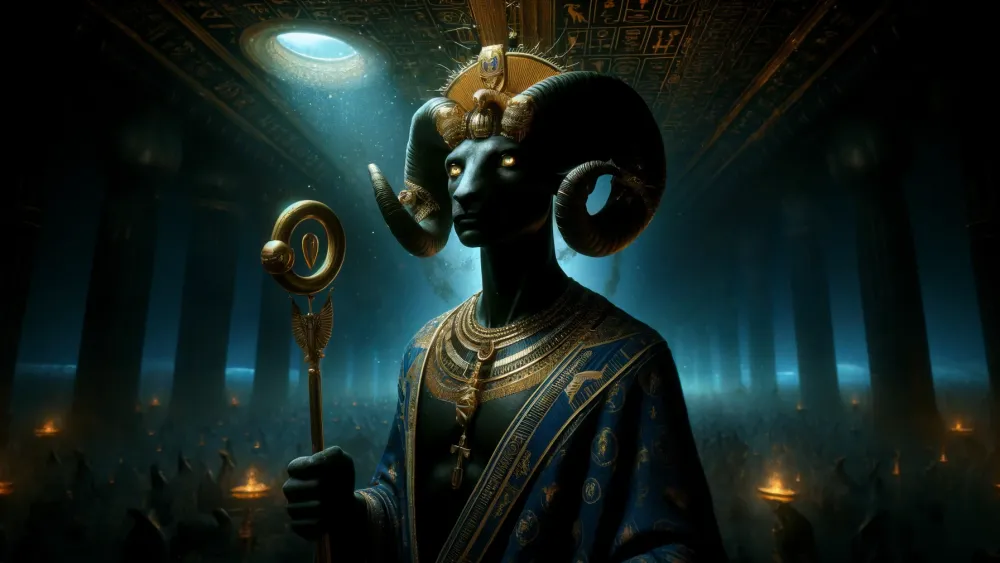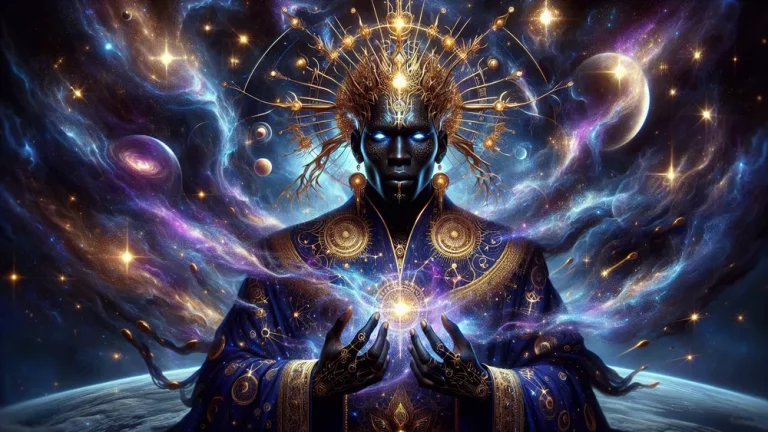Aken: Egyptian God Of Escort And Underworld
In the big, colorful world of old Egyptian stories, Aken is a god who might not be as famous as Osiris or Anubis, but he’s still pretty important. Aken helps souls get to the afterlife. This blog post is going to talk about where Aken came from, what he does, and why he matters.
Key Points:
- Aken is an Egyptian god who guides souls to the afterlife.
- Aken’s role is crucial in ancient Egyptian mythology, especially during the Middle Kingdom period.
- Aken is often represented as a ferryman or boatman in ancient Egyptian art.
- Aken’s name variations, like Aqen or Akhen, reflect different dialects and regional differences in ancient Egypt.
- Aken’s significance is seen in rituals, texts like the Pyramid Texts and Book of the Dead, and his influence on later cultures.
- Aken’s role as a psychopomp is similar to figures like Charon in Greek mythology.
- Aken’s influence on later cultures can be seen in adaptations like the Roman god Mercury, who also guided souls to the afterlife.
We’ll look at how he fits into Egyptian myths and how he has influenced other cultures and religions. Aken’s job is to guide souls, and that gives us a special look at what ancient Egyptians thought about death and what happens after. So, let’s dive in and learn more about this interesting god and his place in the world of Egyptian mythology.
Aken: Overview and Key Facts
| Aspect | Details |
|---|---|
| Name | Aken (sometimes spelled Aqen) |
| Role | Guide of souls to the afterlife, a psychopomp |
| Mythological Domain | Underworld, afterlife |
| Earliest Mentions | Found in old Egyptian texts and stuff, especially from the Middle Kingdom |
| Primary Duties | He helps souls get to the afterlife and assists them on their journey through the underworld |
| Associated Deities | Osiris, Anubis, and other gods of the underworld |
| Iconography | Often shown as a ferryman or boatman, sometimes with a boat or oar |
| Symbols | Boat, oar, sometimes a staff |
| Cultural Significance | Represents the journey of the soul and the transition from life to afterlife |
| Worship Practices | Not much direct worship, more often mentioned in funerary texts and rituals |
| Key Texts | Pyramid Texts, Coffin Texts, Book of the Dead |
| Comparative Mythology | Similar to Charon in Greek mythology, and other psychopomp figures in various cultures |
| Archaeological Findings | Artifacts that show Aken, references in tomb writings |
| Influence on Later Cultures | Elements of Aken’s mythology can be seen in later religious and cultural beliefs about the afterlife |
This table gives a detailed look at Aken, covering his role, importance, and how he is shown in old Egyptian mythology.
The Origins of Aken
To get a grip on Aken’s spot in Egyptian myths, we gotta check out where he popped up and how he showed up in old texts and stuff. Let’s jump into his backstory and how his name changed over time.
Historical Background of Aken
So, the first time we hear about Aken is in these old Egyptian texts, like the Pyramid Texts and Coffin Texts. Think of these as the ancient Egyptians’ how-to guides for the afterlife. Aken shows up during the Middle Kingdom period, which is around 2055-1650 BCE. This was a time when Egypt was buzzing with activity and new ideas.
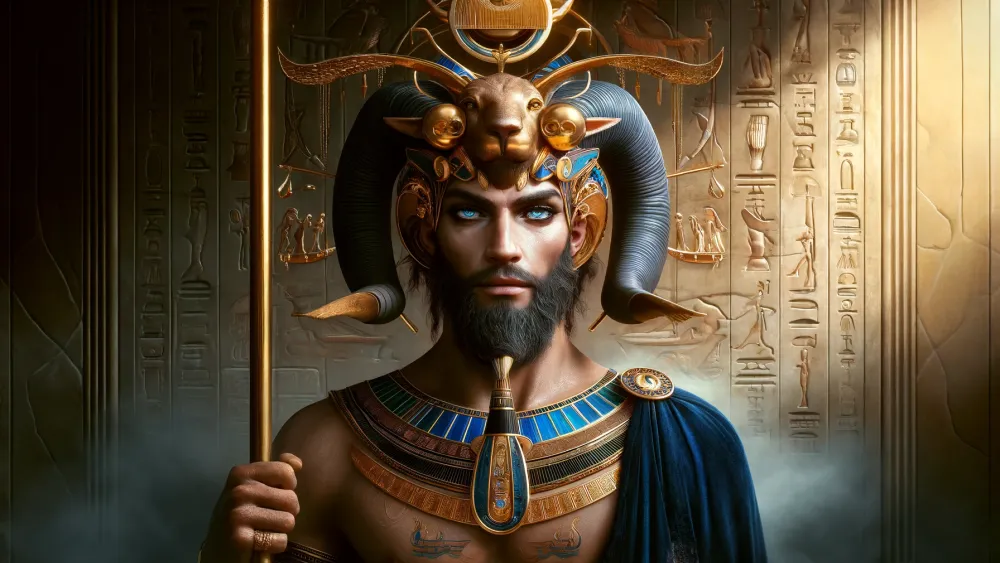
They were really diving deep into their beliefs about what happens after you die. Archaeologists have dug up some cool stuff, like tomb writings and carvings, that show Aken as a ferryman or boatman. Picture him as the ancient Egyptian version of a helpful guide, making sure souls didn’t get lost on their way to the afterlife.
These discoveries give us a glimpse into how crucial Aken was in their spiritual journey.
Aken, a crucial figure in ancient Egyptian spiritual beliefs, acted as a guide for souls on their way to the afterlife, as revealed by tomb writings and carvings from the Middle Kingdom period.
Etymology and Name Variations
When you dig into the different names and spellings of Aken, you find a wild mix. In various sources, you might see his name written as Aken, Aqen, or even Akhen. These variations aren’t just random; they tell us a lot about how ancient Egyptians viewed him.
The name “Aken” in the ancient Egyptian language is thought to mean something like “he who is patient” or “he who waits,” which makes sense because he was the guide for souls, patiently helping them on their journey to the afterlife. Now, when you see the name spelled as Aqen, it’s not just a typo. This variation can highlight different dialects or regional differences in ancient Egypt.
Think of it like how we have different accents and slang in English today. These name variations give us clues about how widespread and significant Aken was in their culture. So, when you come across different spellings, remember they all point back to the same important figure, just seen through slightly different lenses.
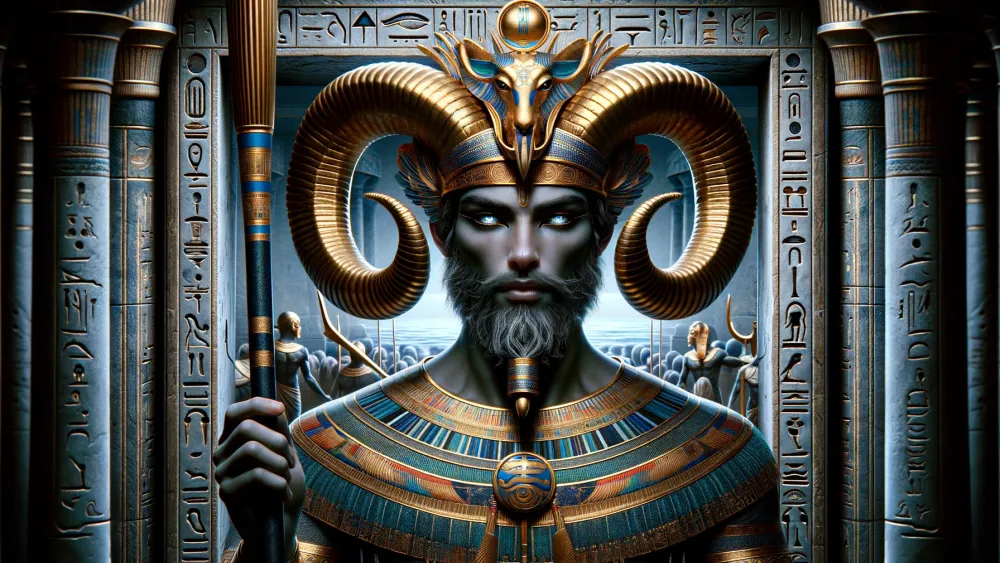
Aken’s Role in Egyptian Mythology
Alright, so we’ve dug into Aken’s origins and all those name twists. Now, let’s jump into what he actually did in Egyptian mythology. His roles and duties? They paint a vivid, colorful picture of his importance.
Duties as a Psychopomp
Aken’s main job was guiding souls to the afterlife, kind of like a cosmic tour guide. Imagine the soul’s journey as a road trip, and Aken is the one making sure you don’t take a wrong turn. When someone died, their soul had to navigate through the treacherous waters of the underworld, and Aken was there to ferry them safely across.
Think of him as the ancient Egyptian version of a GPS, but way cooler. He’d take the soul on his boat, ensuring they reached their destination without getting lost or stuck. Now, if you compare Aken to other psychopomp deities, like Charon from Greek mythology, who ferried souls across the River Styx, you’ll see some similarities. Both were essential in helping souls transition from the world of the living to the afterlife.
But while Charon demanded a coin for passage, Aken’s role was more about guidance and protection. So, Aken wasn’t just a ferryman; he was a guardian, making sure every soul found its way to the afterlife safely.
Aken and the Underworld
Aken had some pretty big responsibilities in the Egyptian underworld. Picture the underworld as a vast, complex city with different neighborhoods, and Aken knew all the shortcuts. He was mainly associated with the region called the “Duat,” which was like the main hub where souls had to pass through. Aken’s job was to navigate these souls through the Duat, ensuring they didn’t get lost in its labyrinthine paths. He wasn’t working alone, though.
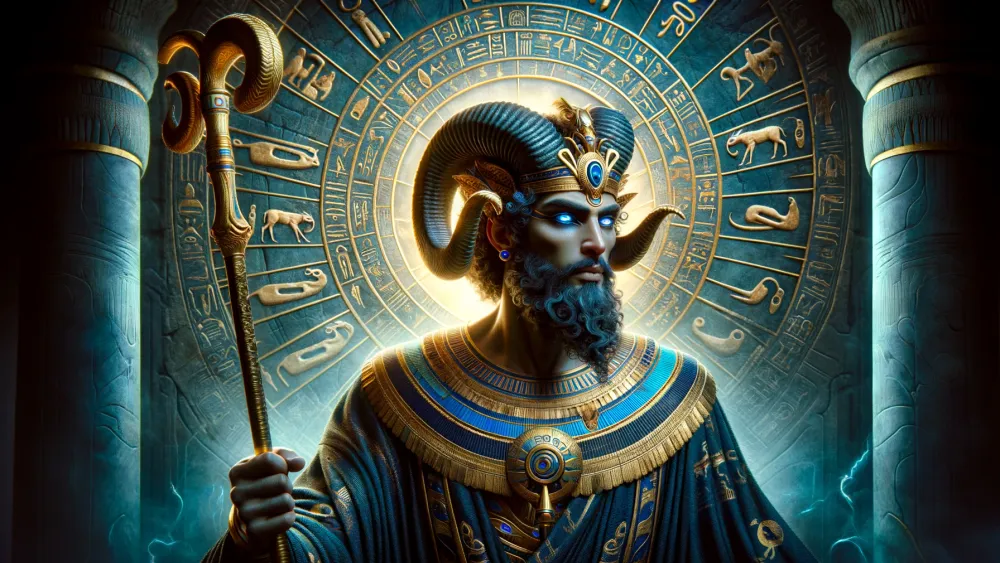
Aken interacted with other deities like Osiris, the god of the dead, and Anubis, the jackal-headed god who weighed the hearts of the deceased. Think of it like a team effort, where Aken was the guide, Osiris was the judge, and Anubis was the one who checked if you had a good heart. Together, they made sure every soul found its rightful place.
Aken played a crucial role in guiding souls through the Egyptian underworld alongside other deities like Osiris and Anubis, creating a team effort to help souls find their rightful place.
Depictions and Symbolism of Aken
Alright, so we’ve talked about Aken’s job and his hangout spots in the underworld. Now, let’s jump into how he looked and what he stood for in ancient Egyptian culture.
Iconography and Artistic Representations
Aken, in ancient Egyptian art, often shows up as a figure steering a boat. Think of him like a cosmic gondolier, navigating the waters of the underworld. He usually holds a pole or an oar, which symbolizes his job of ferrying souls. You might also see him with a beard, a common feature in depictions of gods, showing his divine status.
One notable artifact is a relief found in the tomb of Seti I, where Aken is shown guiding the pharaoh’s soul. This piece is significant because it highlights Aken’s importance in ensuring safe passage to the afterlife. Another example is a small statue found in a lesser-known tomb, where Aken is depicted with a serene expression, emphasizing his role as a calm and reassuring presence.
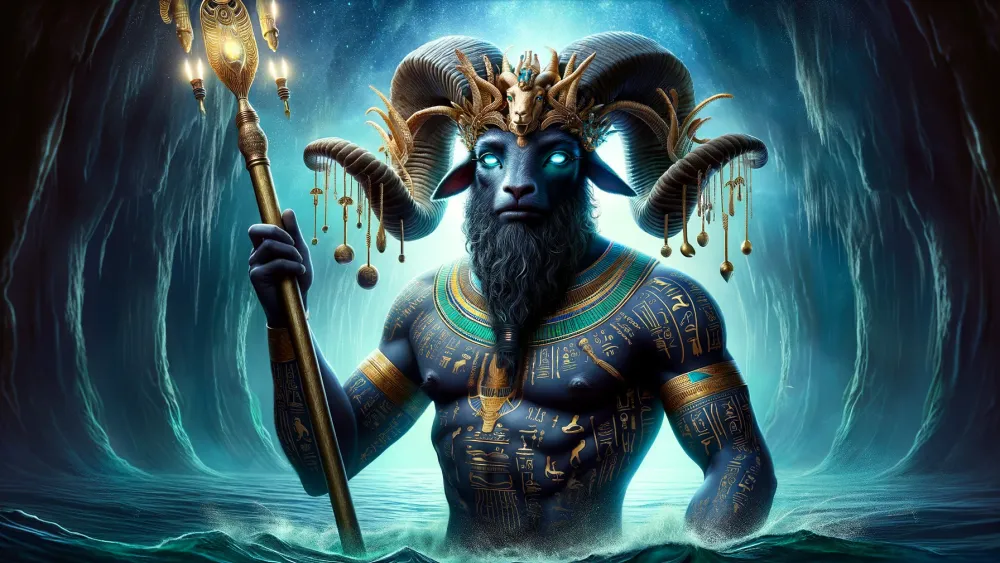
Symbolism and Cultural Significance
Aken’s depictions pack a punch when it comes to symbolism. When you see him steering a boat, it’s not just about guiding; it’s about transition and safe passage. In the grand scheme of Egyptian mythology, Aken stands as the ultimate link between life and the afterlife. Think of him as the best travel guide ever, making sure souls don’t get lost.
This role made him a symbol of reliability and protection. His calm face in statues and reliefs? It screams calmness and reassurance, qualities the Egyptians held dear for their journey to the afterlife. Aken’s symbolism seeped into Egyptian culture big time. People believed that a smooth passage to the afterlife was a must for eternal peace.
This belief shaped their rituals, their art, and even their daily lives, as they wanted to make sure Aken would guide them when their time came. So, when you look at Aken, you’re not just seeing a god; you’re seeing a symbol of hope and security in the face of the unknown.
Worship and Cult of Aken
Alright, so we’ve dug into Aken’s symbolism and how it shaped Egyptian culture. But what about the nitty-gritty of their devotion? How did they actually show their reverence?
Temples and Worship Practices
When it comes to Aken, the ancient Egyptians didn’t mess around. They built temples and shrines to honor him, though not as many as for some other gods. One known temple dedicated to Aken was located in Abydos, a significant religious site. Imagine walking into a place filled with incense, chanting, and offerings. People would bring food, drink, and sometimes even small statues as gifts.
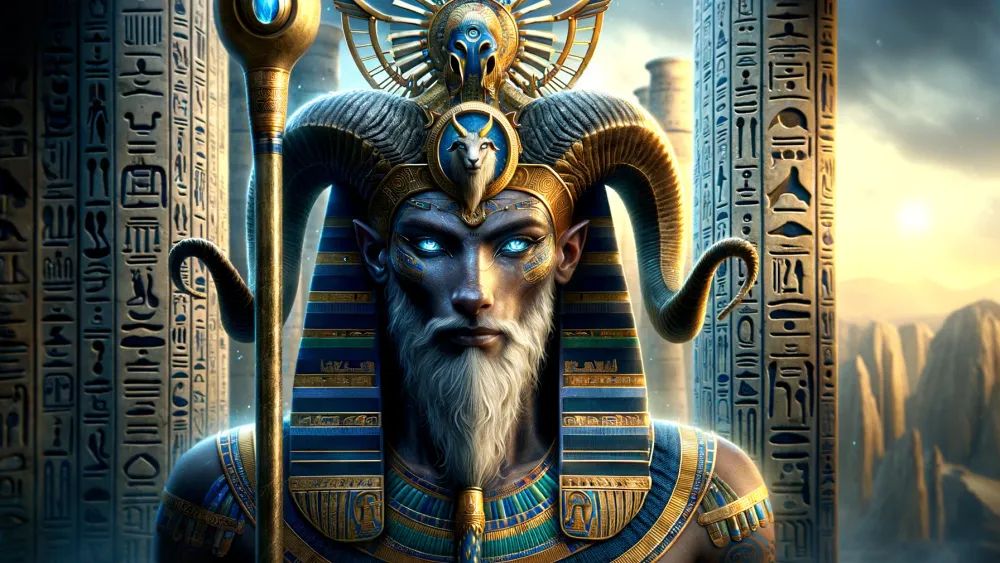
They believed these offerings would please Aken and ensure he would guide their souls safely. Rituals often included prayers and hymns sung by priests, who acted as intermediaries between the people and the god. Picture a priest standing in front of an altar, reciting sacred texts while the smell of burning incense fills the air.
These ceremonies were not just about asking for help; they were about building a relationship with Aken, making sure he knew they respected and needed him. So, when you think of Aken, remember that his followers went to great lengths to show their devotion, creating a rich tapestry of worship practices that brought them closer to their god.
Ancient Egyptians showed great devotion to Aken through elaborate rituals and offerings to build a strong relationship with him.
Aken in Religious Texts
Aken shows up in a bunch of ancient Egyptian religious texts, and these mentions give us a peek into how important he was. One key text is the “Book of the Dead,” which is like a guidebook for the afterlife. Imagine it as a travel guide, but for souls navigating the underworld.
In this text, Aken is described as the ferryman who helps souls cross the dangerous waters to reach the afterlife. Another important mention is in the “Pyramid Texts,” which are some of the oldest religious writings in the world. These texts were inscribed on the walls of pyramids and tombs to help the deceased navigate the afterlife. Aken’s role here is crucial because he ensures that the soul reaches its destination safely.
Think of him as the ultimate GPS for the afterlife. These references show that Aken was not just a minor deity but a key player in the journey of the soul. So, when you read about Aken in these texts, you’re seeing how the ancient Egyptians viewed the afterlife and the vital role Aken played in it.
Pantheon of Egyptian Gods
When you jump into the world of Egyptian mythology, it’s crucial to get a grip on the huge lineup of gods and goddesses that make up this fascinating belief system. From the famous Ra, the sun god, to the not-so-famous Aken, each god had their own unique job and story.
If you’re itching to explore the all Egyptian gods, you can check out this ultimate list of all the major gods and goddesses in Egyptian mythology. This guide will give you a deeper appreciation of how these deities influenced every aspect of ancient Egyptian life, from the cosmos to the underworld.
FAQs
1. How Was Aken Depictured In Ancient Egyptian Art?
Aken was depicted in ancient Egyptian art as a figure guiding the solar barque through the underworld.
2. What Were Aken’s Primary Responsibilities In The Underworld?
Aken’s primary responsibilities in the underworld included guiding souls to their final resting place and ensuring their safe passage through the various regions of the afterlife.
3. How Did The Ancient Egyptians Honor Aken?
The ancient Egyptians honored Aken through rituals and ceremonies performed at temples and shrines dedicated to him.
4. Can Aken Be Compared To Any Gods In Other Mythologies?
Aken can be compared to other psychopomp deities like Charon from Greek mythology due to their shared role in guiding souls to the afterlife.

